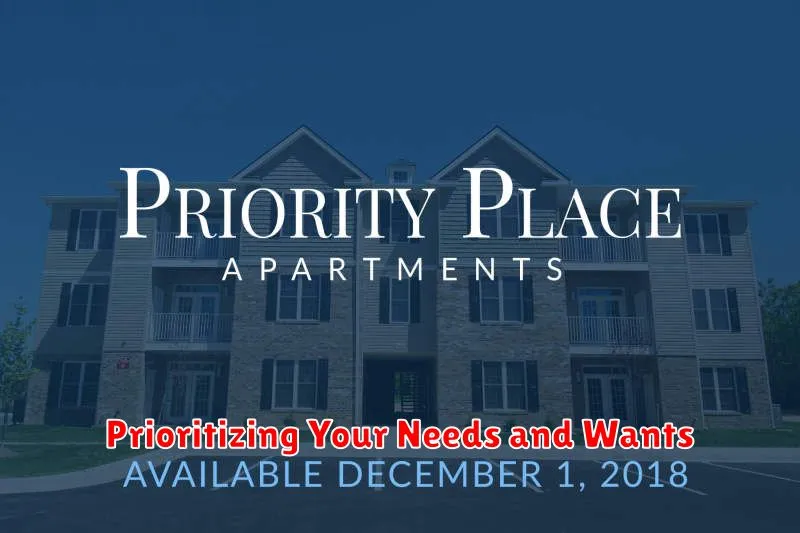Finding the perfect apartment can be a stressful experience, especially if you’re on a tight budget. With so many factors to consider, like location, amenities, and price, it’s easy to feel overwhelmed. But don’t despair! There are ways to find amazing deals on apartment rentals without sacrificing your dream home. In this article, we’ll explore some proven strategies for scoring the best deals, covering everything from negotiating rent to leveraging online resources. So, buckle up and get ready to unlock the secrets to finding your dream apartment at a price you can afford!
Setting a Realistic Budget
Before you start browsing apartments, it’s crucial to set a realistic budget. This involves considering your income, expenses, and financial goals. Create a detailed budget that outlines your monthly income and all your expenses, including rent, utilities, groceries, transportation, and entertainment.
When setting your budget, be sure to factor in unexpected costs. These could include repairs, maintenance, or emergencies. Aim to allocate a percentage of your income towards savings, ensuring you have a financial safety net.
Remember, rent should not consume more than 30% of your take-home pay. This guideline helps ensure you have enough money for other essential needs and expenses.
Don’t forget to include additional expenses like renter’s insurance, parking fees, and pet fees if applicable. By accurately assessing your financial situation, you can determine a realistic rent range that will keep your budget balanced and manageable.
Researching Neighborhoods and Amenities
Once you have a good understanding of your budget, it’s time to start researching neighborhoods and amenities. This will help you narrow down your search and find apartments that fit your lifestyle. Consider factors such as:
- Proximity to work or school: How long will it take you to get to your destination? Do you want to walk, bike, or take public transportation?
- Safety: Is the neighborhood safe? Is it well-lit at night? Are there any crime statistics available?
- Access to amenities: What kind of amenities are important to you? Do you want to be close to restaurants, shops, parks, or public transportation?
- Community atmosphere: Is it a family-friendly neighborhood? Is it bustling with nightlife? Or is it more of a quiet, residential area?
- Cost of living: Is the neighborhood more expensive or more affordable than others? Consider the cost of rent, utilities, groceries, and transportation.
Once you have a good understanding of your priorities, you can start searching for apartments in neighborhoods that fit your needs. Many websites, such as Zillow, Trulia, and Apartments.com, allow you to filter your search by neighborhood, price range, and amenities.
It’s also a good idea to do some on-the-ground research. Visit the neighborhoods you’re interested in and get a feel for the area. Talk to local residents and ask them about their experiences. You can also check out local blogs, forums, and social media groups for more information about specific neighborhoods.
By taking the time to research neighborhoods and amenities, you can find an apartment that is a perfect fit for your needs and budget.
Timing Your Search Strategically
The real estate market, including the apartment rental market, is cyclical. Understanding these cycles can significantly impact your ability to find the best deals. Peak season for apartment rentals typically falls between March and August, coinciding with school breaks and warmer weather. During this time, competition is high, and landlords often have the upper hand. Shoulder seasons, like early spring (February-March) or late fall (September-October), tend to be less competitive, offering more negotiating power and potential for lower prices.
However, timing your search isn’t just about the calendar year. It’s also about understanding the specific timeline of your move. If you’re flexible with your move-in date, you can often leverage that flexibility to your advantage. For example, if you’re willing to wait a few weeks or even a month, you may find better deals than someone who needs immediate housing.
Finally, remember that holidays can also influence pricing. Weeks surrounding major holidays, like Thanksgiving, Christmas, or New Year’s, may see higher prices due to increased demand. While it’s often easier to find deals during holidays, it’s crucial to factor in the potential impact on your budget and the possibility of limited availability.
Utilizing Online Listing Platforms and Resources
In today’s digital age, finding the best deals on apartment rentals is easier than ever thanks to the plethora of online listing platforms and resources available. These platforms provide a centralized hub for renters to browse available properties, compare prices, and contact landlords directly. Some of the most popular and effective platforms include:
- Apartments.com: This comprehensive website features a vast database of rental listings across the country, allowing you to filter by location, price range, amenities, and more.
- Zillow: Similar to Apartments.com, Zillow offers a user-friendly interface for searching and filtering apartment listings. It also provides valuable insights on rental market trends and estimated rent prices.
- Trulia: Trulia is another popular platform known for its detailed property information and neighborhood insights. You can access rental listings, neighborhood reviews, and crime statistics to make informed decisions.
- Craigslist: While not as polished as other platforms, Craigslist remains a valuable resource for finding local apartment rentals. You can often find deals on Craigslist that are not advertised on other websites.
- Facebook Marketplace: Facebook Marketplace is a convenient platform for browsing local listings, including apartments for rent. It’s a great option for finding deals from individuals or small landlords.
When utilizing online listing platforms, it’s important to be aware of potential scams. Always verify the legitimacy of listings, contact landlords directly, and be wary of any requests for personal information before securing a lease agreement. Additionally, consider using resources like:
- Rent.com: Rent.com provides a comprehensive guide to finding affordable rentals, including tips on negotiation and lease agreements.
- Apartment Guide: Apartment Guide offers valuable information on rental market trends, average rent prices, and reviews of specific apartment communities.
- Rental Housing Search Engines: Specialized rental search engines, such as PadMapper and RentHop, can help you narrow down your search based on specific criteria and preferences.
By leveraging these online resources, you can streamline your apartment search, identify potential deals, and find the perfect rental property that meets your budget and needs.
Networking and Referrals for Hidden Gems
Networking and referrals are essential for finding hidden gem apartment deals. You can tap into a treasure trove of information by connecting with people in your network and asking for their recommendations.
Start by asking friends, family, and colleagues if they know of any great apartment deals in your desired area. You can also ask people on social media or in online forums. They might have valuable insights into specific buildings or neighborhoods.
Don’t forget to leverage your professional network. Talk to your coworkers, former employers, and anyone else you might have business connections with. They may have access to exclusive listings or know of landlords who are looking for tenants.
Consider joining local Facebook groups or online forums dedicated to housing and rentals. These groups often have active communities where people share tips and recommendations on finding great deals. You can also find referrals for reliable real estate agents or property managers through these forums.
By tapping into the power of your network and utilizing online resources, you can gain access to hidden gem apartment deals that might not be advertised on traditional platforms.
Negotiating Rent and Lease Terms Effectively

Once you’ve found an apartment that ticks all the boxes, it’s time to negotiate the rent and lease terms. Don’t be afraid to ask for what you want, as landlords are often willing to compromise to secure a tenant.
Here are some tips for negotiating effectively:
- Research the market: Before you begin negotiations, know the going rate for comparable apartments in the area. This will give you leverage when discussing rent.
- Highlight your strengths: Let the landlord know what makes you an ideal tenant, such as your strong credit history, stable income, or long-term commitment.
- Offer a longer lease: Landlords often prefer longer leases as they provide stability and consistent income. Offering a longer lease term might lead to a lower rent or other concessions.
- Be open to compromises: You might not get everything you want, but be willing to negotiate on certain aspects. Perhaps you can negotiate a lower security deposit or a shorter lease term in exchange for a slightly higher rent.
- Get it in writing: Once you’ve agreed on terms, make sure everything is documented in writing. This includes the rent amount, lease length, and any special concessions.
By following these tips, you can increase your chances of securing a great deal on your next apartment rental.
Leveraging Incentives and Promotions
Landlords and property managers often offer incentives and promotions to attract tenants. These can be valuable tools for saving money on your rent. Some common incentives include:
- Free rent for the first month or more
- Reduced rent for a certain period
- Security deposit specials, such as a reduced deposit or waiving the deposit entirely
- Moving expense reimbursements or gift cards
- Free upgrades, such as appliances or parking
To find these deals, you need to be proactive:
- Ask directly about incentives when you’re touring apartments.
- Check online listings for any mention of promotions.
- Follow apartment communities on social media for announcements.
- Negotiate for better deals. Many landlords are willing to offer incentives to secure a tenant.
Considering Off-Season Rentals
If you’re flexible with your move-in date, consider renting during the off-season. Many landlords offer discounted rates or special incentives during the off-season to attract tenants. This is especially true in popular tourist destinations or areas with a high concentration of college students.
For example, if you’re looking to rent an apartment in a beach town, you might find better deals during the winter months when the weather is cooler and fewer people are visiting. Similarly, if you’re looking to rent an apartment near a university, you might find better deals during the summer months when students are away.
Before you commit to renting off-season, be sure to do your research and understand the local market. Some landlords may offer significant discounts, while others may only offer a small reduction in rent. It’s also important to consider the amenities and features of the apartment, as well as the location and surrounding neighborhood.
Inspecting Apartments Thoroughly
Once you’ve narrowed down your apartment search, it’s crucial to thoroughly inspect each property before making a decision. This step allows you to identify any potential issues or red flags that could impact your living experience. During your inspection, pay close attention to the following:
Overall Condition: Look for signs of wear and tear, water damage, or structural problems. Inspect the walls, ceilings, floors, and windows for any cracks, stains, or leaks. Check the exterior of the building for any visible damage, such as peeling paint or loose siding.
Plumbing: Run the faucets and shower to check for leaks or low water pressure. Flush the toilets and observe if they work properly. Look for any signs of mold or mildew around the sinks and tubs.
Electrical System: Test all the outlets and light switches to ensure they are working. Make sure the electrical panels are not overloaded or showing any signs of damage.
Heating and Cooling: Turn on the heater and air conditioner to check if they are working properly. Note the temperature and airflow to ensure adequate comfort throughout the year.
Appliances: Test all the appliances, including the refrigerator, oven, stove, dishwasher, and washer/dryer (if applicable). Ensure they are in good working condition and meet your needs.
Safety Features: Inspect smoke detectors, carbon monoxide detectors, and fire extinguishers. Ensure they are present, working, and properly installed.
Noise Levels: Pay attention to any outside noise that might be bothersome, such as traffic, construction, or neighbors. It’s helpful to visit the apartment during different times of the day and night.
Neighborhood: Take a walk around the neighborhood to get a feel for the area. Consider factors like accessibility to transportation, grocery stores, and other amenities. Look for signs of crime or any other safety concerns.
By conducting a thorough inspection, you can uncover any potential problems that might not be immediately apparent. This can help you avoid unpleasant surprises later on and ensure you find an apartment that meets your needs and expectations.
Prioritizing Your Needs and Wants

Before you even start looking at apartments, it’s important to prioritize your needs and wants. This will help you narrow down your search and avoid wasting time looking at places that don’t fit your criteria.
Consider these questions:
- What are your absolute must-haves? These are the things you cannot live without, such as a certain number of bedrooms, a washer and dryer, or a pet-friendly building.
- What are your nice-to-haves? These are the things that would be great to have but aren’t essential, such as a balcony, a dishwasher, or a parking space.
- What are your deal-breakers? These are the things you absolutely cannot live with, such as a noisy neighborhood, a building with bad security, or a landlord who doesn’t respond to maintenance requests.
Once you have a clear understanding of your needs and wants, you can start looking at apartments that fit your criteria. This will help you find the best deals on apartment rentals and avoid wasting time and money on places that don’t meet your needs.
Working with a Real Estate Agent (Optional)
While not essential, working with a real estate agent can be beneficial when searching for an apartment rental. Agents have access to listings that may not be publicly available and can provide valuable insights into the market. They can also help you negotiate the best possible price and lease terms.
However, be aware that real estate agents typically work on commission, meaning they receive a percentage of the rent as their fee. It’s important to discuss their fee structure upfront and ensure you’re comfortable with their services. If you decide to work with an agent, it’s crucial to find one who specializes in rentals and has a strong understanding of the local market.
Avoiding Rental Scams and Fraudulent Listings
When searching for a new apartment, it’s important to be cautious of potential scams. Scammers often create fake listings and use deceptive tactics to steal money from unsuspecting renters. Here are some tips to help you avoid rental scams and fraudulent listings:
Be wary of deals that seem too good to be true. If the rent is significantly lower than comparable apartments in the area, there could be a reason. The listing may be a scam or the apartment might have hidden problems.
Don’t send money to someone you haven’t met in person. If a landlord asks for a deposit or first month’s rent before showing you the apartment, it’s a red flag. Legitimate landlords will typically require a deposit or rent payment only after you’ve signed a lease.
Always verify the identity of the landlord. Ask for the landlord’s name and contact information and check that it matches the information on the lease agreement. You can also try to find the landlord’s name online to see if they have any online presence.
Be cautious of pressure tactics. If a landlord is pressuring you to make a decision quickly, it could be a sign of a scam. You should have plenty of time to review the lease agreement and make sure you’re comfortable with the terms.
Use a reputable rental website or agent. Many websites and agents are dedicated to helping people find apartments and prevent scams. Be sure to choose a site or agent that has good reviews and is known for being reliable.
Trust your instincts. If something feels off, it probably is. Don’t be afraid to walk away from a deal if you have any doubts.
Understanding Lease Agreements and Terms
Before you sign on the dotted line for your new apartment, it’s crucial to fully understand the terms of the lease agreement. This document outlines the legal responsibilities of both you and the landlord, covering everything from rent payments to maintenance responsibilities.
Key terms to look out for:
- Lease Period: This specifies the duration of your lease, typically ranging from 6 months to a year.
- Rent Amount: Clearly stated is the monthly rent amount, including any additional fees like parking or utilities.
- Security Deposit: This is a refundable amount paid upfront to cover potential damages. Make sure to understand how the deposit will be returned and what constitutes a valid reason for deductions.
- Pet Policies: If you have pets, carefully review the pet policy regarding permitted breeds, fees, and any restrictions.
- Late Fees: Understand the penalties for late rent payments, as they can add up quickly.
- Maintenance Responsibilities: The lease defines who is responsible for repairs and maintenance, both for the unit and the common areas.
- Early Termination: Understand the consequences and costs of breaking the lease early.
- Renewal Clause: This outlines the process for renewing your lease at the end of the initial term.
It’s highly recommended to read the entire lease agreement thoroughly, including the fine print. Don’t hesitate to ask your landlord or a legal professional to clarify any unclear terms. Taking the time to fully understand your lease agreement will ensure a smooth and hassle-free rental experience.
Securing Your Dream Apartment

Once you’ve found the perfect apartment within your budget, the next step is to secure it. This involves navigating the application process and making a strong impression on the landlord. Here are some key tips:
Be Prepared: Have all necessary documents readily available, including your ID, proof of income, and credit report. A strong credit score is essential, so take steps to improve it if necessary.
Submit a Strong Application: Fill out the application thoroughly and accurately, highlighting your positive attributes as a tenant. Be prepared to provide references and a detailed explanation of your rental history.
Act Quickly: Don’t delay in submitting your application. Competitive rental markets often mean that desirable apartments get snapped up quickly. Be ready to act promptly to secure the best deal.
Communicate Effectively: Maintain clear and respectful communication with the landlord or property manager. Address any questions promptly and be proactive in the application process.
Be Flexible: While getting your dream apartment is a top priority, be open to compromises. Consider alternative floor plans or units within the building that might also fit your needs.
By following these steps, you can significantly increase your chances of securing your dream apartment and enjoying a comfortable and convenient living space.

